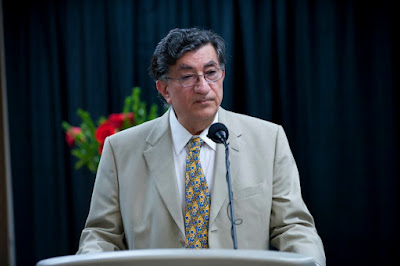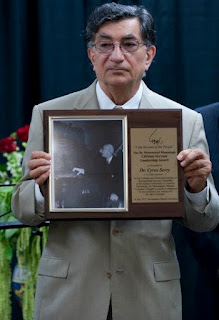Uncovring the Mystique of Dr. Cyrus Serry in the Iranian Community of Chicago
My original image of Dr. Serry involves a baring scene, with
some similarity, but not exactly the kind that people expect in the Hollywood
movies! In 1990s, when Azar and I were raising a young family in Glenview, we
often would go to the Golf Mill Mall. Like other Malls, there was a central
open sitting and meeting place where we would often sit so children can play
around. During one of those visits, I met an Iranian man in his late-middle age
with a good bit of gray hair. Soon after we opened a conversation, in a highly
emotional way, he relayed to me that his life was recently saved by what he
referred to as the great Dr. Serry; and as if wanting to prove it to me, and to
my astonishment, he unbuttoned his shirt and bared his entire chest to show me the
marks of the open-heart surgery performed by Dr. Serry.
Thinking about this memory and reflecting on knowing Dr.
Serry for more than three decades, I know in my own mind and heart that Dr.
Serry was indeed the King of Hearts in the Persian community, not just by
treating their beating hearts, but also by caring for and healing the soul of
the heart of his community members.
Borrowing the words of a giant observer of Omar Khayyam,
Clarence Darrow, I believe Dr. Serry like Khayyam, “by constantly observing the
frailties of the human heart, adopted its rare lesson, that of all the virtues,
charity is the Chiefest!”
Now, it would be remiss of me not to state the fact that without
his wife, our dearest Dr. Mahin Serry, we wouldn’t have the same Dr. Cyrus Serry.
Their marriage, from my observation, was one of the life, liberty and pursuit
of happiness, not just for self but for their communities. So, without Dr. Mahin
Serry as the benevolent and kind queen, we wouldn’t have the honor and privilege
of being so deeply touched by her husband, the king of hearts, our own king Dr Cyrus
Serry.
From the famed 1 Corinthians 13:13, we know that “And now
these three remain: faith, hope and love. But the greatest of these is love.”
Dr. Serry was a man of faith, not only to his family and profession
but also to his Iranian-American identity. For as much as I could see and tell,
he kept faith with his beliefs, which in my observation and assessment were
primarily of a cosmopolitan Iranian. As an Iranian-American, his faith was in
our common and unbounded humanity, and he mostly expressed it through his love
of Persian music, poetry and through his life enhancing wit and humor.
He was a man of hope, not just by being hopeful, but more by
giving hope to anyone who sought his help for meeting a need or for advancing
an idea; I am sure so many people among Iranians in Chicago and beyond can
share more than one story about how Dr. Serry kept their hopes alive for
healing a wound or meeting a need. For Azar and - me, he was the champion of
many ideas which we presented to him. In 2001, we and the late Dr. Houshang
Keshavarz Sadr, held the biggest conference to date for commemorating the
legacy of Iran’s democratic premier, Dr. Mohammad Mossadegh. Yet to hold such a
landmark conference, we needed men and women of courage who would give us hope.
The budget for the conference was hefty. It was Dr. Serry who in a crucial
preliminary meeting stood up and said if no one else supports this conference,
he will still provide for the entirety of the budget. His courage gave heart to
others to contribute as well and make it a collective effort. That conference
became the base for founding Mossadegh Servant Leaders Hall at Northeastern
Illinois University twelve years later in 2013.
Yet more than faith and hope, Dr. Serry should be remembered
as the man with a loving heart who loved everyone he cared for or came
across him - family, colleagues, friends, and community - by his charitable
character and selfless giving.
I believe he would give me the permission to recite a poem
of Khayyam to portray his loving essence:
Indeed, the mystique and embodiment of Dr. Serry was his big
inclusive loving heart in which he had “malice toward none; with charity for
all.”
In years to come, when we look back at the history of
Iranian-American community in Chicago from late 20th century through
the first two decades of 21st, many of us would remember Drs. Cyrus
and Mahin Serry in Chicago as the era under the reign of King Cyrus and Queen
Mahin’s loving, inclusive and charitable hearts.
Thank you.





Comments